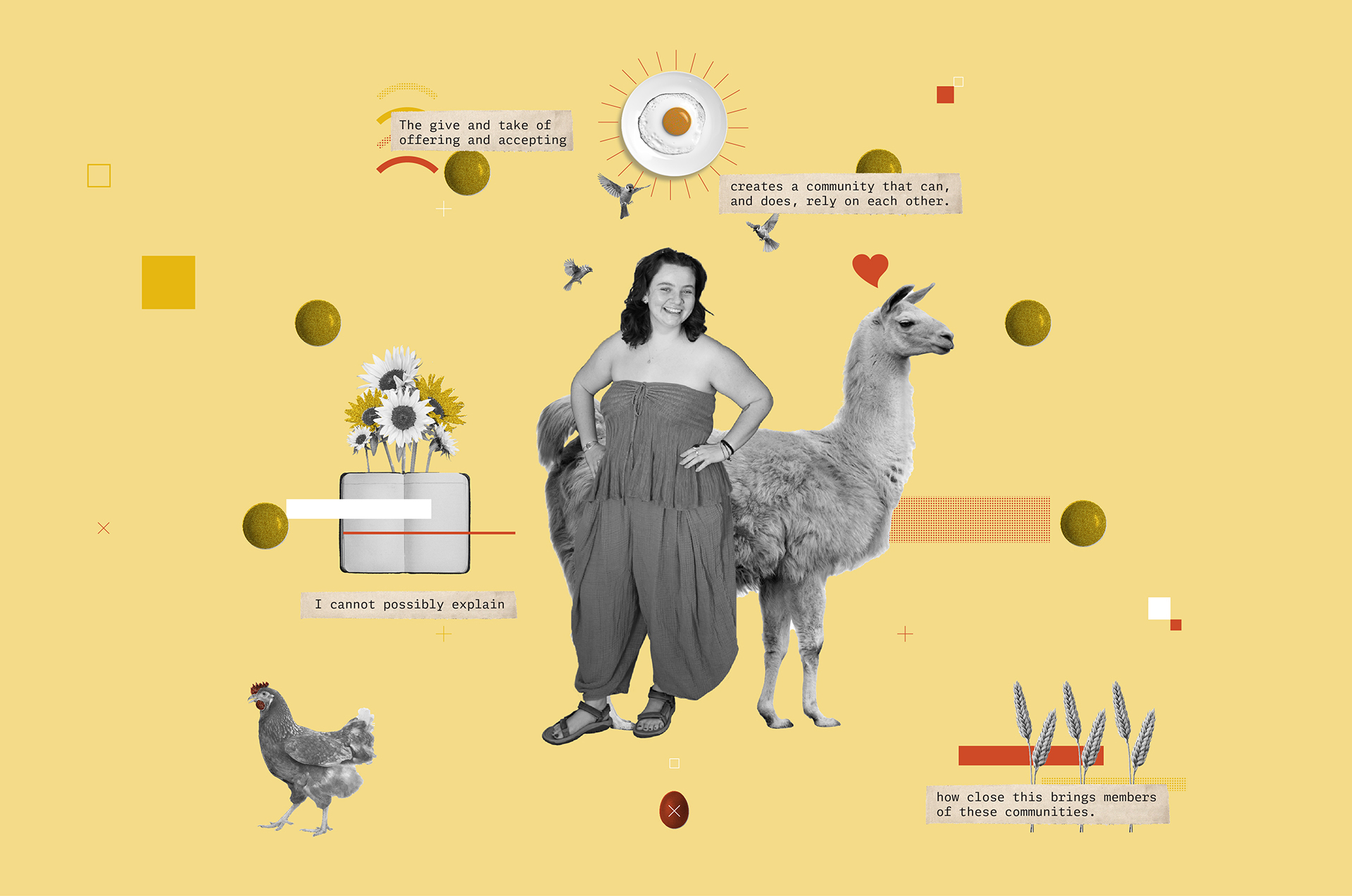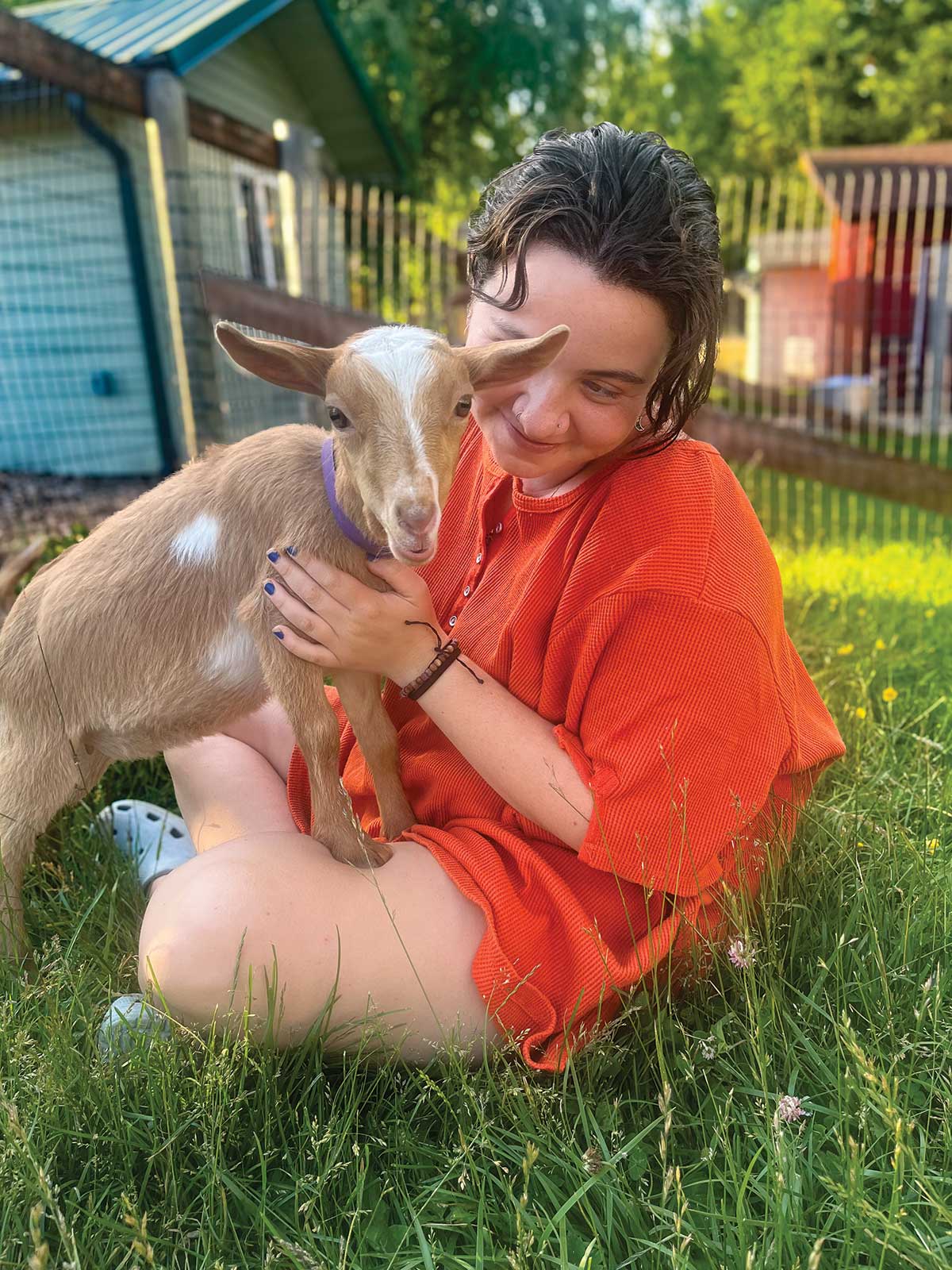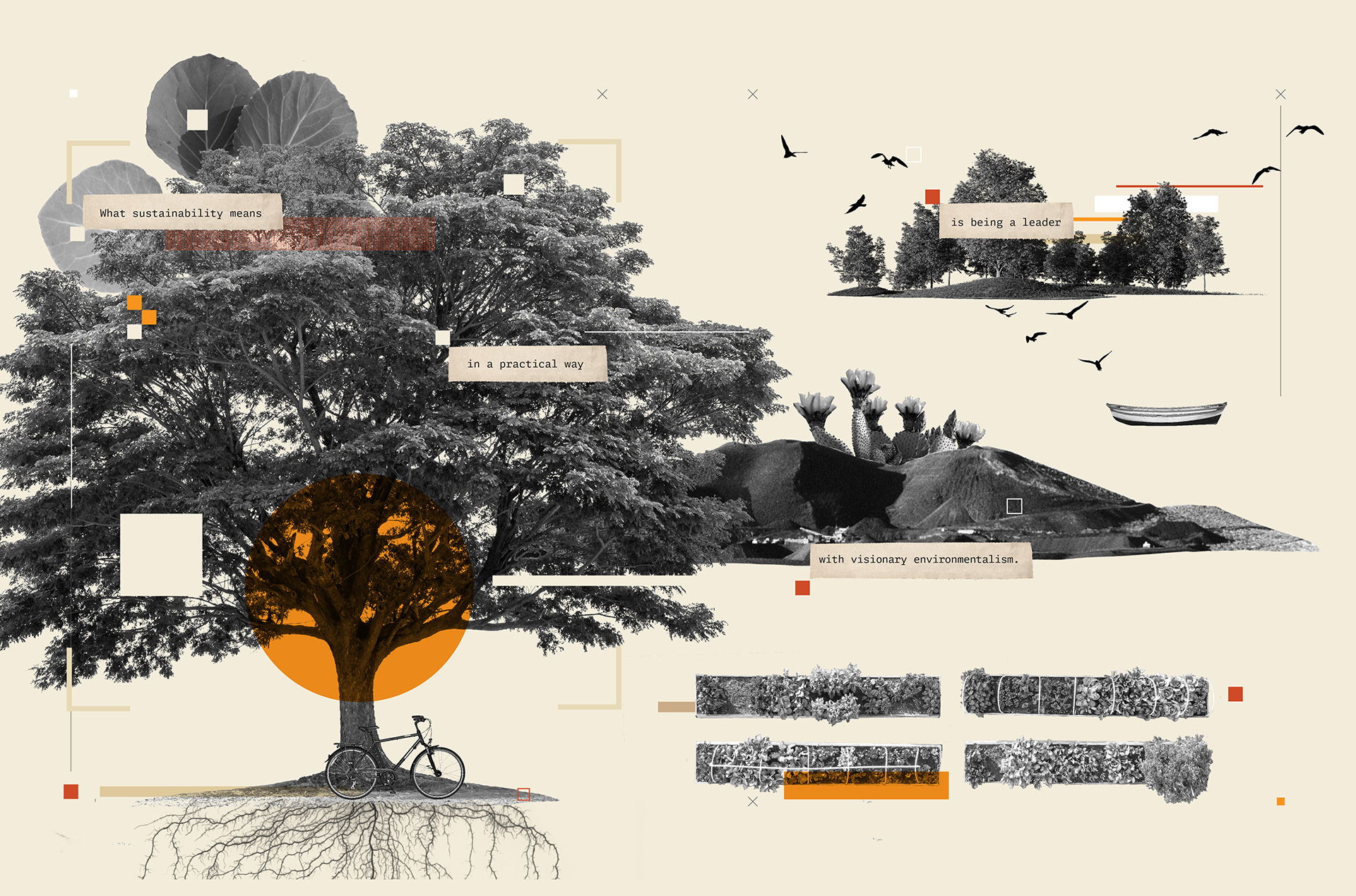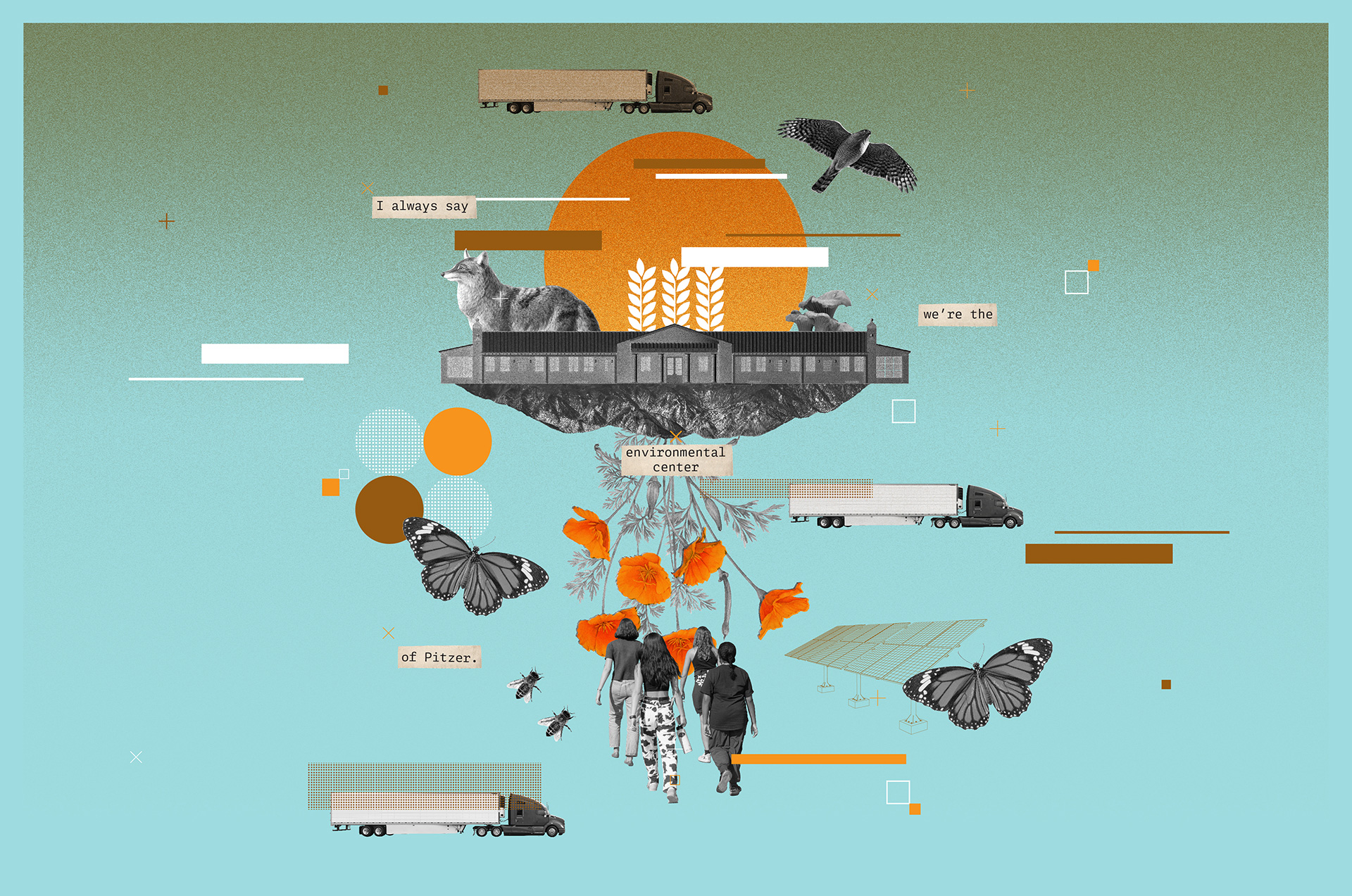
Lessons From a Little Farm
The author reflects on what she’s learned about the balance of nature
from getting up extra early and living communally
By Wynne Chase ’26
2023-24 Grove House Caretaker
y whole life I’ve worked on little farms. When I was young, my mom sent me to a co-ed overnight camp in Massachusetts, which, to this day, provides the brightest memories when I’m feeling nostalgic about my childhood. I would wake up surrounded by about 25 other sleeping children my age and make breakfast with the other early risers for everybody on the farm. Each day varied, but, as an animal and crop farm, generally we would do farm maintenance and take care of all the sweet animals. We did not have electronics at the farm, so in our spare time we told stories, made crafts, walked the lovely trails on the property, and more. It was idyllic.
When I outgrew camps, I got my farm fix through World Wide Opportunities on Organic Farms (WWOOF); I was alone in the big world to gain independence in an agricultural setting. If you haven’t heard of WWOOF, it’s an organization in which people who own farms allow visitors room and board in exchange for farm work.
Last year, during some dreary winter days in Claremont, I allowed myself to dream of the upcoming summer. I feared, though, with all my potential plans, I would finally out-farm myself, and I would be too weary of the early mornings and manual labor.
But that wasn’t the case. In fact, when summer started, my love for the agricultural world grew. In spades! But I never can explain my love for farming without a jumble of praises, so I’ve finally taken the time here to carefully delineate some of the most important experiences and lessons I’ve had.
Waking Up Early
I’ve always been an early riser, but few people rise as early as a farmer. I am never-endingly amazed when I wake up at 6:30 a.m., thinking it must be the middle of the night, and the head farmer has already been up for two hours doing likely the most back-breaking work in recorded history. Eventually, I came to realize that spending time with others resulted in our sleep schedules beginning to align. And when my elder-farmer idol and I started to get up at the same time, I certainly took notice.
Waking when farmers do made me feel like I got an extra day within each existing day. I was able to do more, and it made me realize that prior to this improvement in my circadian rhythm, I could never have made the most of each day because I just wasn’t awake enough to do so.
Along with the ability to add more substance to my days, I also had the opportunity to enjoy life slowly. Waking earlier meant I could eat breakfast lazily; suddenly I had time to track the leaves outside the window that were whisked away by a spontaneous gust of wind. I sat with the farm dogs and gave them the love and attention they deserved (and begged for). Few things now are as important to me as taking it slowly. Admittedly, in college, it’s hard to slow down. The world is moving so quickly around us, and if we take a step back, we risk being left in the dust. Due to this pressured pace, I value (and do sometimes hate—because I am only human) my long walks to classes at Pomona College that are built into my days. I get to spend 23 minutes listening to the bustle of ever-busy students and watching how different seasons are reflected in the environment around me.
Helping One Another
When living on the farm, possibly the most pivotal culture shock was being asked, “How can I help you?” Hello?! I never expected anyone to just offer themselves up to help me right after finishing all of their chores. And the craziest part is, I started to reciprocate with that question! I’m sure the guilt of feeling like the least kind person on the farm would have gotten to me if I didn’t offer. I truly think that offering up your services to work together in such a beautiful collective effort, even when your own work is finished for the day, is one of the kindest and most rewarding things that a person can do.
The give and take of offering and accepting creates a community that can, and does, rely on each other. I cannot possibly explain how close this brings members of these communities.

“The land is what grounds us. We were born on it, and it’s where we’ve lived our whole lives. Working on farms has given me an understanding and appreciation of nature, and all the environmental concerns and issues you hear about every day, in a completely unexpected and intimate way.”
–Wynne Chase ’26
Living Communally
In a college setting, we’re incredibly lucky because we mostly live walking distance from all our peers. Opportunities for such a lifestyle dwindle impressively after and away from college. There is something special about places where you can see your peers at all hours because you get to experience when they’re not performing—when they’re sleepy or stressed or emotional or uncontrollably happy.
Farms provide that environment; typically, in this setting, members of the community will cook together or for one another, take care of anybody who is sick (sometimes with some incredible plant-made remedies), and just generally spend almost every second together.
Getting Absolutely Disgusting
At the end of each day on one of the farms, I had chicken excrement coating every inch of my shoes and pants. My hands were perpetually dirt-covered, and one day a bird actually thought my hair looked like the most luxurious toilet of all. It didn’t matter. I wasn’t embarrassed. Everyone looked disgusting.
And there is something so freeing about no longer worrying about conforming to every single beauty standard. It would be insane of me to claim that all of these standards no longer irritatingly shadowed my days just because I was on a farm, but certainly many of them melted away due to the situation and the community.
Talking to Animals, Trees, Bugs, Yourself
As much as I’ve stressed the community on farms, sometimes there are not many people there. Sometimes you work alone and sleep alone and wake up alone. This lifestyle can take some getting used to, but it can provide the most impactful opportunity to look inward or get creative about entertainment and one’s interactions.
I realized, on a farm in Maine, that my closest friend might be the llama I was trying to win over.
He would stay away from me, on the opposite side of the pasture, and mirror my movements like an incredibly adept boxer circling the perimeter of the ring. I finally decided to start talking to him the way you do with animals you’re trying to befriend.
I used a high, soft voice and reassuring phrases. I didn’t realize that what I really wanted was to talk to somebody. Eventually, as time went on, the llama warmed up (slightly) to me. I giggled (assumably with him) when a chicken flew up and sat on his back. I talked to him a lot; he listened to many speeches about the potential symbiosis of our friendship. Talking to him made me feel like I had company.
I also talked to myself through the form of journaling. I use my journal mostly as a way to recall the events of my days, instead of a place to describe emotions. I journaled so much during those days, and I found moments every day to write about. I went from just needing a friend to talk with to having a llama partner who sort of liked me and having a robust journal that I still look back at now and cry while reading.
Giving Back to Nature
The land is what grounds us. We were born on it, and it’s where we’ve lived our whole lives. Working on farms has given me an understanding and appreciation of nature, and all the environmental concerns and issues you hear about every day, in a completely unexpected and intimate way.
No matter how removed we may become or feel from the natural world, it is always giving to us. And, to me, farming feels like the first step in reciprocating those gifts.
And if I were to opine slightly here, I would add that anything we can do to help the Earth survive a little longer is our most important work.
This piece has been adapted from a Dec. 7, 2023, article in The Outback News student publication.



